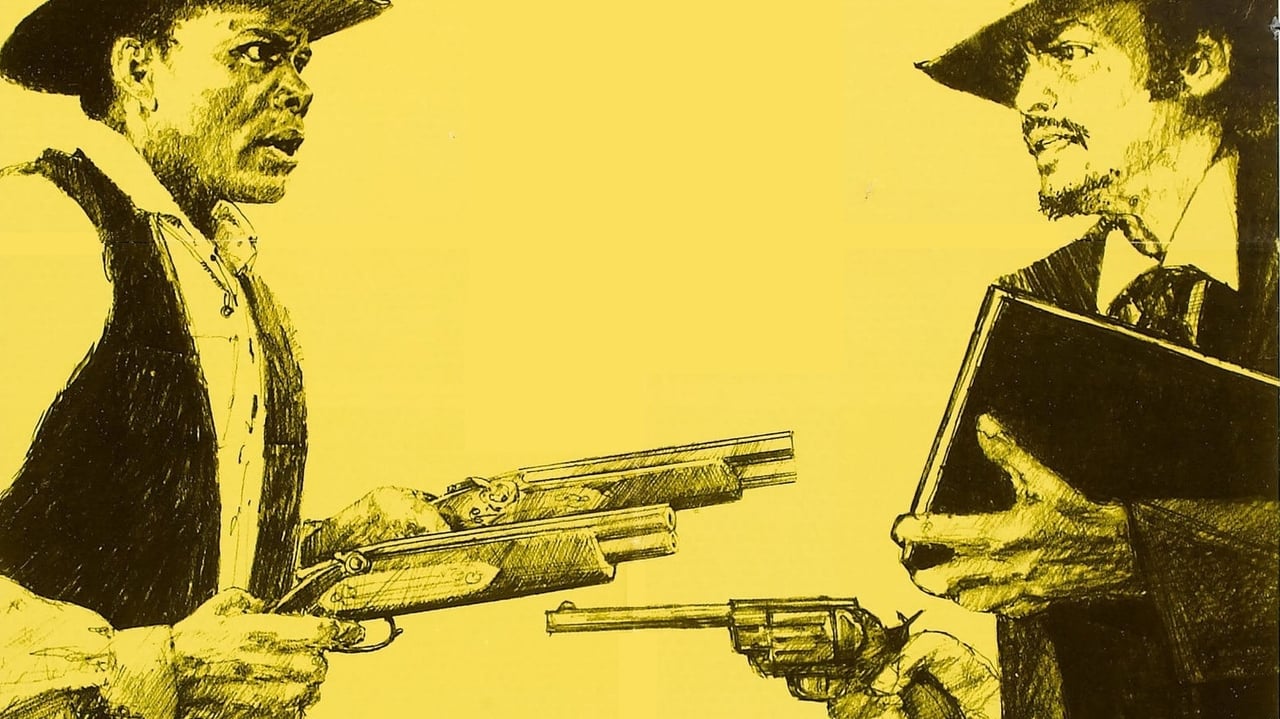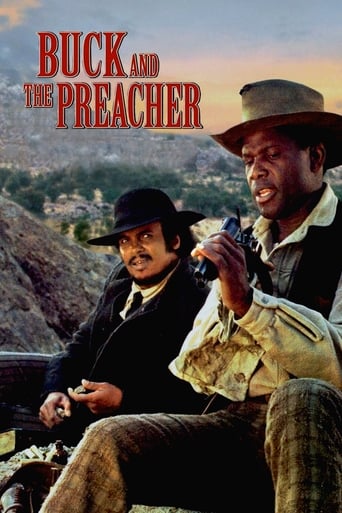Ameriatch
One of the best films i have seen
Comwayon
A Disappointing Continuation
filippaberry84
I think this is a new genre that they're all sort of working their way through it and haven't got all the kinks worked out yet but it's a genre that works for me.
Murphy Howard
I enjoyed watching this film and would recommend other to give it a try , (as I am) but this movie, although enjoyable to watch due to the better than average acting fails to add anything new to its storyline that is all too familiar to these types of movies.
zardoz-13
The serio-comic African-American western "Buck and the Preacher," starring Sidney Poitier and Harry Belafonte, certainly wasn't the first black horse opera, but it may reign as the most prestigious. For the record, the earliest known African-American western was a silent movie, "The Crimson Skull" (1922), that dealt with a cowboy who thwarted rustlers by wearing a skeleton costume. Fifty years later, "Buck and the Preacher" came out. Not only does it qualify as a good, entertaining western, director Sidney Poitier and co-star Harry Belafonte sought to make an oater that chronicled the tribulations facing African-Americans who had uprooted themselves from the post-antebellum South and were heading westward to start new lives that had nothing to do with slavery. Cast as a former Union soldier with the rank of sergeant, Buck became a wagon master who escorted freedom seeking slaves to new lands. The conflict in "Buck and the Preacher" grows out of this exodus from Louisiana, and the appointed representatives of those plantations that dispatched desperadoes, such as evil Beau Deshay (Cameron Mitchell of "Garden of Evil"), who gathered a small army to terrorize blacks and compel them to turn back and pick up where they had left off. At one point, one of Beau's relatives who survived told a lawman that an old way of life had to be maintained. The sheriff of Copper Springs (John Kelly of "The Revengers") warns Deshay to 'walk softly' in his town because the migrating blacks are committing any crimes. Instead, the sheriff is intent on hunting down Buck (Sidney Poitier of "Lilies of the Field") and the Reverend Willis Oakes Rutherford (Harry Belafonte of "The World, the Flesh, and the Devil") after they shoot up Copper Springs and rob the bank. Although they are breaking the law, Buck and the Preacher have struggled to recover the money that Deshay's mob has stolen from them. When Buck counts only $157 left over from some fourteen hundred dollars, the Preacher suggests that they rob the bank.Mind you, "Buck and the Preacher" depicts an on-again, off-again friendship between the two eponymous characters. Initially, Buck steals the Reverend's horse because he has ridden his own horse into the ground. Buck is fleeing from Deshay and his rabid gun hands, and Deshay knows that he has been leading the African-American settlers. Buck not only appropriates the Reverend's fresh mount, but he also helps himself to a rabbit roasting over a campfire. The screenplay by Ernest Kinoy, who scripted an earlier Poitier movie "Brother John," slickly pits our two protagonists against each other until they can become as thick as thieves. Deshay and his gun hands encounter the Reverend Rutherford in the hamlet of Frenchman's Ford since they have been trailing Buck's horse. Instead of killing the silver-tongued Reverend, Deshay dangles the prospect of $500 in the Reverend's face for word about the whereabouts of Buck. Eventually, Buck and the Preacher cross trails again, and Buck still doesn't have any use for the garrulous Preacher. Indeed, he believes the Preacher cannot be trusted. The Preacher administers a blow to Buck and rightfully claims his horse. Buck swaps horses before he sets out to lead the newest caravan of pioneers.In case it isn't clear, Deshay and his despicable gun hands are prepared to kill some of the settlers and burn their wagons with their sole possessions in order to turn them around. Eventually, Buck and the Preacher catch up with Deshay and his hooligans. They find these murderous cutthroats in Madame Esther's bordello and a gunfight ensues, with Buck demonstrating the power of his special arsenal of hand guns. Forged by a gunsmith in Fort Leavenworth, Buck wields a pair of heavy calibered weapons. Indeed, he must reload them because they hold only two bullets each, but the wallop that these firearms pack down cut a man down like a scythe. Deshay and most of those around him, aside from his relative Floyd (Denny Miller of "Tarzan, the Ape Man"), die in the gunfight at the bordello. Floyd rides with the sheriff's posse to catch Buck and the Preacher. In a sense, Buck and the Reverend Willis Oakes Rutherford aren't conventional heroes. They are battling not only the villains, but they also contend with a world that treated African-Americans as second-class citizens. "Buck and the Preacher marked Sidney Poitier's debut as a film director. Poitier and Belafonte had hired Joseph Sargent, director of "White Lightning" and "Colossus, the Forbin Project," but Sargent and his two leading actors had a difference of opinion. They fired Sargent, and Columbia Pictures couldn't find a replacement on such late notice, so Poitier took the helm. "Buck and the Preacher" is as western as all get out.
movingwater
Hollywood would have us imagine the western migration as an all-white experience. This picture tells the story with black actors, although facing the same menace they flee, racism. The antagonists are a gang of "night-riders" both hunting Buck, but also terrorizing the black wagon-train. My main complaint is a terribly annoying, invasive soundtrack, featuring a Jew's Harp of all things. (Like blues harmonica, a little goes a long way!)
Trombonehead
I just saw this movie for the first time on Turner Classic Movies tonight. I had heard about it, but missed it. It's just another shoot-'em-up horse opera, but this time with a difference. It's one of the only westerns ever made that is a story about black people in the Old West, with black actors in the lead roles. Harry Belafonte is excellent as the Preacher. Sidney Poitier is also very good, and although the story contains the full compliment of standard cowboy movie clichés---shoot-outs, posse chases, bank robberies, whining ricochet sounds, etc.---, it's very entertaining. The vast majority of Hollywood westerns are exclusively white, and feature virtually no black people at all. Indians are almost always featured as pidgin-speaking cigar-store cartoon characters, with white actors usually in the speaking parts. Some idiot composer came up with the pounding tom-toms, descending minor theme music played by trombones and low brass whenever Indians come into the picture. It's unbelievable how ridiculous this music is. Hollywood has a lot to answer for in its racist treatment of minorities throughout its early history, which has never been fully addressed. So it's great to see a western like Buck and The Preacher that is different. As a result, it's a lot better than your average western, even though it milks the same old clichés.
JoeytheBrit
This might possibly be the first Western to feature two black leads with white characters largely relegated to peripheral roles – or stereotypically villainous parts. Sidney Poitier – who replaced Joseph Sergeant as director one week into the shoot – and Harry Belafonte play the leads. Poitier is Buck, a former cavalry man now acting as a wagon-master guiding former slaves to a new life in the west. Belafonte is the preacher, a semi-reformed con man who briefly considers betraying Buck and his charges to the evil nightrider Deshay (a squinting, cigar-chomping Cameron Mitchell) before throwing in his lot with him.This being a film of the early 70s, there isn't much of a moral code here. The good guys steal from one another and rob banks, a character defect shrugged off with the explanation that the town folk – who are pre-occupied on a posse-ride to catch the duo as they rob the bank – deserve to be robbed. The film is presumably supposed to be a semi-comic action film but it isn't particularly funny and the action scenes are few and far between. The film is also light on dialogue with lengthy spells played out in silence. This was Poitier's directorial debut and it shows in some glaring narrative gaps and a strange kind of painstaking attention that somehow transmits itself onto the screen so that the film rarely seems to flow the way it should. Poitier never really convinces as an actor either, although Belafonte is a standout as the sneaky, morally dubious preacher.

